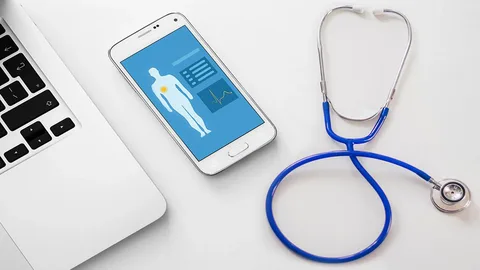Tech
Revolutionizing healthcare app development: Why investing in it is essential.

The 21st century is the era of fast life and demand for quick reactions. There is no need to mention how important it is for the healthcare industry. That is why customers are seeking efficient ways to connect with various healthcare specialists and manage their medical needs. Consequently, medical professionals and healthcare institutions are constantly exploring innovative approaches to improve their services and meet the growing demands of their patients.
The integration of healthcare services with mobile technology has become increasingly prevalent. With over 47,526 iOS healthcare apps and 325,000 mHealth Android apps available, it’s evident that the future of healthcare lies in mobile app development. This shift towards the mobile economy is imperative for all healthcare professionals and organizations, and they should be well aware of why and how to build a medical app.
A reputable healthcare app development company not only facilitates better patient care management but also enhances operational efficiency within clinics and hospitals. By leveraging mobile applications, patients can bid farewell to long waiting lines and embrace a more seamless and convenient approach to accessing medical services.
However, the question remains: Is investing in medical healthcare applications truly justified?
Reasons to develop a healthcare app
Let’s delve into the compelling reasons why healthcare app development is a worthwhile investment.
#1 Streamlined administrative framework
While the primary goal of healthcare facilities is to provide patient care, there are numerous internal administrative processes that require efficient management. A robust healthcare app can significantly alleviate the burden of these administrative tasks, allowing healthcare professionals to focus more on patient care.
#2 Speed and flexibility
Mobile healthcare applications empower patients by offering them the flexibility to schedule appointments, access medical reports, and make payments without the constraints of traditional waiting lines. This enhanced speed and flexibility contribute to a more efficient healthcare ecosystem.
#3 Error prevention
Manual processes in healthcare settings are prone to errors, which can have serious consequences for patients. By utilizing mobile healthcare apps, the likelihood of errors in diagnoses and treatment plans is significantly reduced, leading to improved patient outcomes.
#4 Enhanced productivity
Integrated databases in medical applications enable healthcare providers to access and update patient records seamlessly, thereby improving the overall efficiency of patient care. This streamlined approach allows healthcare professionals to allocate more time to each patient, ultimately enhancing the quality of care provided.
#5 Patient empowerment
Healthcare apps empower individuals to take control of their health by providing tools for monitoring vital signs, tracking fitness activities, and making informed lifestyle choices. This proactive approach to healthcare encourages individuals to prioritize their well-being.
#6 Compliance with healthcare standards
Adhering to healthcare regulations and security standards is crucial for the success of any healthcare application. Prioritizing the inclusion of industry-specific guidelines and ensuring clear communication with the target audience are essential steps in the development process.
#7 Seamless payment processing
The integration of secure payment gateways within healthcare apps simplifies the billing process for patients, eliminating the need for cash transactions and ensuring a hassle-free payment experience.
#8 Accessibility
The ubiquity of smartphones ensures that healthcare apps are always within reach, expanding the reach of healthcare services to a wider audience.
#9 Patient community engagement
Incorporating social networking features within healthcare apps fosters a sense of community among patients, encouraging them to support each other in leading healthier lifestyles.
What makes a perfect healthcare application?
The healthcare industry is really diving into all the new technology out there, and making mobile apps is a big part of that. But, creating a great healthcare app takes a lot of careful thinking, following strict rules about keeping things safe and private, and really getting what people want and what’s popular in the market.
In 2023, the healthcare landscape faces unique challenges, such as catering to the needs of senior citizens and ensuring the seamless delivery of medical services in the face of global health crises like COVID-19. Addressing these challenges requires a comprehensive approach to healthcare app development, encompassing features such as e-prescribing, door-to-door medication delivery, and stringent compliance with healthcare regulations.
The main aspects of medical app development
The development process involves thorough requirements analysis, stringent adherence to privacy regulations such as HIPAA, and the integration of secure APIs for seamless data exchange. Furthermore, the user interface design must prioritize accessibility for older adults, and the software architecture should be robust and scalable to accommodate the diverse needs of healthcare applications.
Updating old healthcare systems is a careful, step-by-step process. It requires teamwork with IT experts, a good evaluation of what the old systems can and can’t do, and a clear idea of what you want to achieve through the development. It’s really important to get input from professional and competent people like doctors, regulators, and patients to make sure the new system works for everyone. The main goal is to meet all parties’ needs.
When it comes to finding a good partner to make a healthcare app, it’s all about having a smart plan. You need to really understand what you want to do, look at what’s popular, and check out all the potential partners really carefully. It’s also important to think more about quality than just the cost, look at what they’ve done before, and make sure everyone knows what’s expected and how they’ll get paid.
Final words
To sum it up, healthcare has really changed by using more technology, and making healthcare apps has been a big part of that change. These digital health apps have really changed how healthcare is given, giving lots of good things to both patients and healthcare workers. As things keep changing in healthcare, it’s really important to keep making healthcare apps to stay at the front of this fast-moving industry.





















































